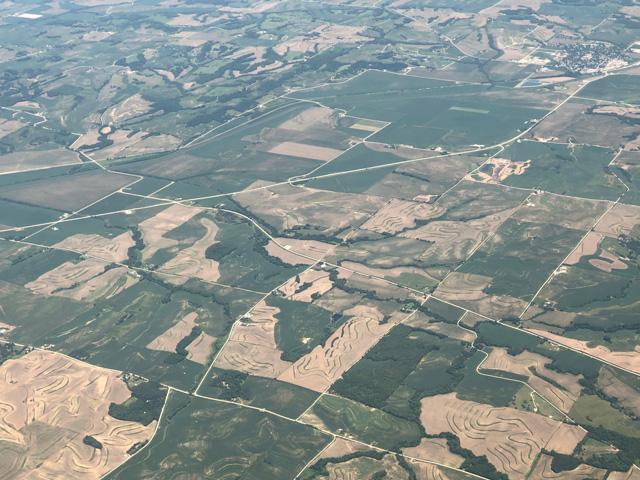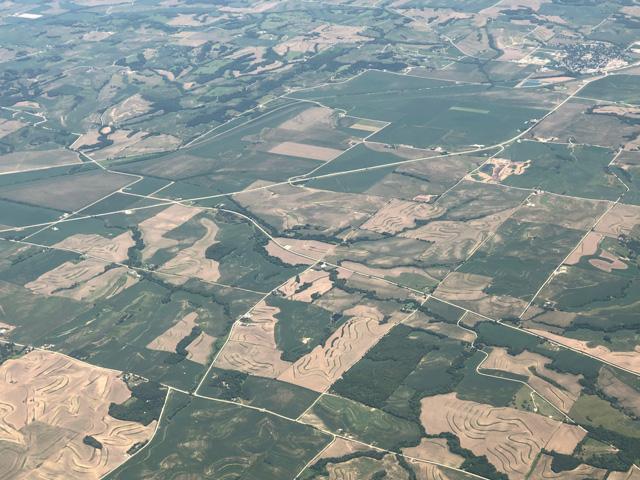An Urban's Rural View
Midwestern Farmers Discuss Suburban-Rural Divide
In my March 10 post on the suburban-rural divide, I pondered whether cultural or economic issues better explain why the countryside increasingly votes Republican. Noting that my rural contacts were mainly commercial farmers and opining that economics was important to the Republicans among them, I invited readers to comment. (https://www.dtnpf.com/…)
Three weighed in with thoughtful emails.
I found what they said interesting and thought you might, too.
Their preference was for anonymity, but I know all three and can attest they are substantial Midwestern farmers. Two are Republicans, one a Democrat.
To varying degrees, they saw both culture and economics playing a role. "The 'old game', Rock, Paper, Scissors, comes to mind," wrote one. "Allow me to modify the old game. 'Faith, Family, Sovereignty, and Profitability'. The order in which these appear in the title is of no consequence."
Making tradeoffs between them would be difficult, this Michigan farmer maintained. "All farmers big and small, need to consider many more issues, more frequently and possibly with greater consequence than their suburban or urban neighbors."
If religion is cultural, his vote went to culture. "I feel, Faith just must be in the game all the time, impacting every action."
P[L1] D[0x0] M[300x250] OOP[F] ADUNIT[] T[]
But he didn't dismiss economics. "Personally, my lean is toward Republican. I agree with your sentence that economics is important to Republicans. However, I do know lots of Democrats that also feel economics are important."
The other Republican farmer devoted most of his email to the burgeoning national debt, which he worries will soon become unmanageable.
"We the people will likely wish backwards for the days when the disputes were simply over gender identity and racial segregation," he wrote. By segregation, he said he meant people are now separating themselves from each other out of fear. "We can't stop ourselves ... I conclude ... except that we trust the Words of Christ to love and accept all. That's simply not a common opinion amongst a large portion of the population. Or so it seems."
His bottom line: The debt has the potential to overshadow every other consideration.
"So when we talk about whether it's social or economic differences at present that is splitting us further apart (I think both, but the extreme of the social is what most talk about out here in Indiana) both will be almost irrelevant at the moment we are truly faced with a default of our debt."
It worries this farmer that China holds so much of the debt. I share his concern about the debt but am less concerned about China being a creditor. There's truth in the old saying, "If you owe the bank a little, the bank owns you; if you owe the bank a lot, you own the bank." China can't liquidate its holdings without driving their value disastrously south.
The third farmer, who described himself as a "fiscally conservative" Democrat, voiced opinions on issues both cultural and economic. They included trade, conservation, health-care costs, gun control, abortion and farm profitability. On trade, he's disappointed with both parties. On the others, he sided with his party.
On health care, for example, he said, "I'm an employer. About 15 people. I hold out hope SOMEBODY might do something to rein in healthcare costs. I see that more likely to come from the left than the right. Most of my employees are Republican."
In my post I had suggested fear of regulation was a reason many farmers vote Republican, and this farmer agreed. "It's my opinion he (Trump) got a lot of farm votes because farmers don't like water regs. My thought is, as a corn grower, that some practices might have cost 10-20 cents a bushel to implement. Trump's trade policies seemed to cost us something like a $1.50-$2.00 a bushel. I would have picked the extra expense if it meant better markets. We'd have had cleaner water and a cleaner conscience too."
Like the other two farmers, he invoked religion. "I go to church," he wrote. "'What would Jesus do' has me thinking things like helping the poor and paying my taxes, (rather) than concerns over topics like abortion." (He thinks abortion is morally wrong but "I've yet to see someone effectively legislate morals.")
Noting the invocation, I wondered whether urban or suburban readers would have mentioned religion in discussing this question. There's survey data suggesting a higher proportion of urbanites and suburbanites are religiously unaffiliated than rural citizens. (https://www.americancommunities.org/…)
It seems likely, then, that religion plays a role in the urban-rural and suburban-rural gaps. How big a role is unclear.
My thanks to these three farmers for their thoughts. I always enjoy hearing from readers. I would be glad to hear from you.
Urban Lehner can be reached at urbanize@gmail.com
(c) Copyright 2023 DTN, LLC. All rights reserved.






Comments
To comment, please Log In or Join our Community .